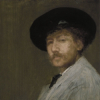James Whistler

James Whistler
James Abbott McNeill Whistlerwas an American artist, active during the American Gilded Age and based primarily in the United Kingdom. He was averse to sentimentality and moral allusion in painting, and was a leading proponent of the credo "art for art's sake". His famous signature for his paintings was in the shape of a stylized butterfly possessing a long stinger for a tail. The symbol was apt, for it combined both aspects of his personality—his art was characterized by a...
NationalityAmerican
ProfessionPainter
Date of Birth11 July 1834
CountryUnited States of America